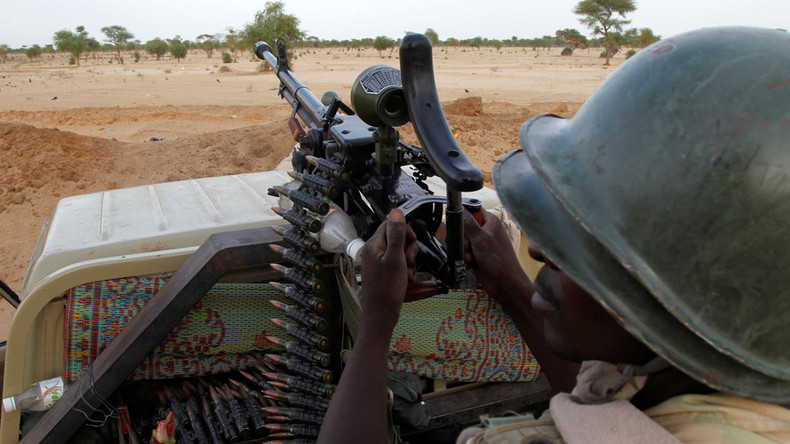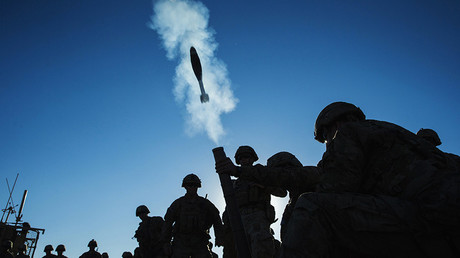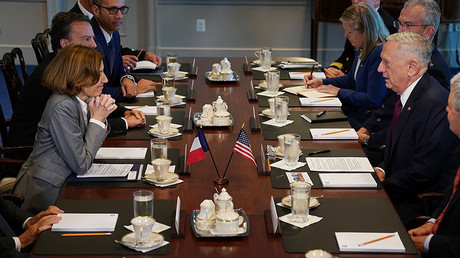Pentagon justifies military expansion in Africa as key to ‘global strategy’
Pentagon justifies military expansion in Africa as key to ‘global strategy’

The Pentagon is calling for an increase in the US military footprint in Africa, where there are over 6,000 troops currently stationed. This as a top general confirms the four US soldiers killed in Niger were ambushed by an Islamic State-affiliate.
Speaking from the Pentagon on Monday, Chairman of the Joint Chiefs of Staff General Joseph Dunford told reporters that US troops in Niger do not go on patrol with local forces unless the chances of enemy combat are “unlikely.” He confirmed the four US service members killed in the October 4 ambush were taken by surprise when they were attacked by a group of 50 militants affiliated with the Islamic State (IS, formerly ISIS/ISIL).
US forces in Niger were ambushed by fighters from Mali, which became a terrorist stronghold after Libya collapsed into chaos and anarchy following the US intervention in 2011. Since then, neighboring countries have seen an increase in the number and severity of terrorist attacks.
While there is no direct combat mission for US troops in Niger, debate in Congress is heating up over whether to update or replace the 9/11-era authorization for use of military force, as the presence of US troops across West Africa gains widespread media coverage.
Dunford described Niger, where there are currently at least 800 US soldiers, as “inherently dangerous.”
The US has more than 6,000 troops stationed in about 53 of the 54 African countries. Most of them, approximately 4,000, are located at Camp Lemonnier in the east African country of Djibouti.
On Sunday, Senator Lindsey Graham (R-South Carolina) and Senate Minority Leader Chuck Schumer (D-New York) both said on NBC’s Meet the Press that they were unaware there were so many troops stationed in the area.
“I didn’t know there [were] 1,000 troops in Niger,” Graham said, adding that he expects to be briefed on their purpose and mission later this week.
However, Graham was one of 26 senators present for an AFRICOM hearing in March, and no lawmakers reportedly asked any questions about the number of troops in the region.
Graham supports sticking with the original Authorization for Use of Military Force, which passed three days after the September 11, 2001 terrorist attacks and sent troops to Afghanistan and then Iraq.
A close ally of Graham’s, Senator John McCain (R-Arizona), is calling for more debate on the issue and has supported the idea of a new authorization. Last week, McCain, who chairs the Armed Services Committee, threatened to subpoena the White House for information regarding the attacks in Niger, claiming he had been told “very little.”
Senator Rand Paul (R-Kentucky), who sits on the Foreign Relations Committee, has clashed with both Graham and McCain over war policy. He attacked Graham on Twitter on Monday as a “warmonger” who should have known about US troops in Niger.
On Friday, Defense Secretary Jim Mattis had meetings with both McCain and Graham and told them about the situation in the region. After the meeting, Graham told reporters that Mattis said the war on terrorism is “morphing.”
“You’re going to see more actions in Africa, not less; you’re going to see more aggression by the United States toward our enemies, not less; you’re going to have decisions being made not in the White House but out in the field,” Graham said, according to the Washington Post.
Speaking to reporters Monday, General Dunford echoed Graham’s statement, describing US troops stationed around the world as a “part of a global strategy.”
Dunford said that the US has been sending troops to Africa and other parts of the world in order to “put pressure” on terrorist groups “simultaneously wherever they are” and “anticipate where they will be” in the future.
He added that the US is building up a “relatively small footprint” of troops around the globe to enable local forces to deal with terrorists“before they become a threat to the American people.”
Mattis and Secretary of State Rex Tillerson are scheduled to address the Senate Foreign Relations Committee on October 30.




0 Comments:
Post a Comment
Subscribe to Post Comments [Atom]
<< Home